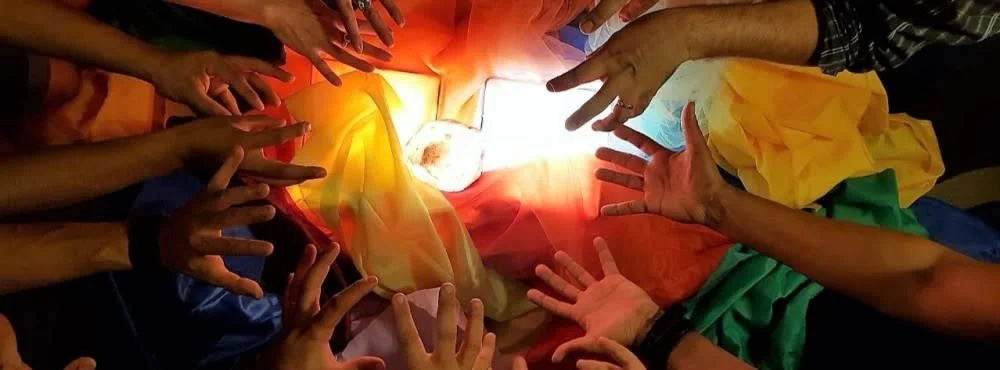Organizations Do Not Build Movements – People Do
In 1998, Sônia Peralli Fonseca founded a small animal rights group in Brazil called Forum Animal. In a country known to be one of the world’s largest consumers of beef, their goal was ambitious: to protect any and all animal species across the country. Over the years, they have trained educators in animal welfarism and held companies accountable by ensuring their commitment to not use eggs from caged hens. Their work is multifaceted and their advocacy efforts span different audiences and areas of focus. Today, they are leading the way in farmed animal advocacy in Brazil.
Many approaches to some of the most pressing issues facing our world today are often large, top-down, and institutional. While there is value in these efforts, there is significant untapped wisdom and power in solutions that grow from the bottom up—as evident in the work by Forum Animal. Here at The Pollination Project (TPP), we are committed to a people-powered model of social change rooted in grassroots activism. Which is why they received a seed grant from us in 2018 for their work in ending donkey slaughter.
Since 2014, we have built a diverse community of nearly 5,000 grassroots volunteer leaders in 116 countries working on projects spanning every major social issue, including a significant focus on animal advocacy and farmed animal activism. As a vegan organization, we believe that even projects that are not explicitly focused on animal rights can in some way, directly or indirectly, contribute to the suffering of non-human animals.
Commitment to bottom-up approaches
Embracing grassroots efforts offers a meaningful opportunity for intellectual diversity and lasting impact. This model works because organizations do not build movements – people do. Those who are closest to the problem itself are the ones who are the most invested in seeking solutions, and they are familiar with and able to mobilize local resources, relationships, and networks in a way that is simply out of reach for outside actors.
This is why we believe that there is value in keeping power and agency at a local level. When communities are encouraged to solve their own challenges, they are more resilient, sustainable, and able to catalyze enduring change. Investments in grassroots work, free from constraints of administrative overhead and bureaucracy, often goes further than other interventions. The authenticity behind these efforts garners community trust, creating networks and a critical nexus of alignment that anchors and amplifies the work itself. Simply put, a groundswell of support simply cannot come from a top-down approach.
Through TPP, these leaders access seed funding through our daily microgrants program, ongoing capacity-building support, and connectivity with others in their geographic or focus area. Our community is predominantly made up of leaders who could not access funding from traditional foundations, many of which view grassroots efforts as too small, diffuse, risky, or labor-intensive.
Highlighting high-impact projects
Many projects that receive seed funding from TPP go on to become significant forces in the animal advocacy movement, proving that even large-scale change often begins at a grassroots level. A few stories and examples include:
Material Innovation InitiativeStephanie Downs, a highly experienced entrepreneur, and Nicole Rawling, a lawyer with over a decade of experience in the plant-based food industry, combined their skillsets and founded the Material Innovation Initiative (MII). The first nonprofit of its kind, MII connects entrepreneurs and scientists with retailers and consumers to bridge the gap between creators and distributors of next-gen materials: plant-based alternatives to leather, down, and other materials. These innovative women imagine a world where “the sustainable option is the default one,” and animal products are replaced by plant-based and lab-grown alternatives.Upon receiving their first seed grant from TPP, MII built a top-notch website that beautifully highlights this valuable work. The website helps spread their message and connects people to one another to create a solution that transcends animal products.
We Animals MediaIn 2014, Toronto-based photojournalist Jo-Anne McArthur founded the We Animals project, an archive of photographs about the often complex and difficult human-animal relationships of contemporary society. The We Animals project has been featured in over 100 campaigns and publications worldwide. McArthur received a grant from TPP and created the We Animals Humane Education Program, an initiative consisting of a series of humane education presentations for youth and adults. McArthur’s vision was that programs would play a role in shaping more empathic citizens by fostering awe, curiosity, and critical thinking about our relationship with animals. In doing so, people could become agents of positive change for animals in their community and around the world.[Editor’s note: we’ve featured Jo-Anne McArthur’s work in our latest blog post interviewing leaders in the animal protection movement.]
EqualiaEqualia is an organization working to generate positive change in society, improve the quality of people’s lives, and protect animals and the environment. The organization is focused on promoting a new law in Spain that would equip all slaughterhouses with closed recording circuit cameras in order to prevent animal abuse.With the TPP grant, Equalia invested in a corporate outreach expert to plan meetings with companies and institutions that would foster speedy policy agreements and social support. The goal was to affect political change at the regional and national levels. Other work done by Equalia include:
Launching undercover investigations
Holding meetings with politicians and companies, while also reaching out to labor unions and consumer associations for their support
Launching a campaign in November 2018 requesting mandatory surveillance cameras to be installed in every slaughterhouse in the country
If these stories are inspirational to you, visit thepollinationproject.org for more examples of meaningful change sparked by grassroots community leadership. We provide seed funding and capacity-building support to launch grassroots initiatives that solve societal problems. Every day of the year, our team of advisors—most of whom have previously received support from TPP for their own projects—selects a new project that will receive seed funding. Together, we can create a kinder, more compassionate world for all beings.

